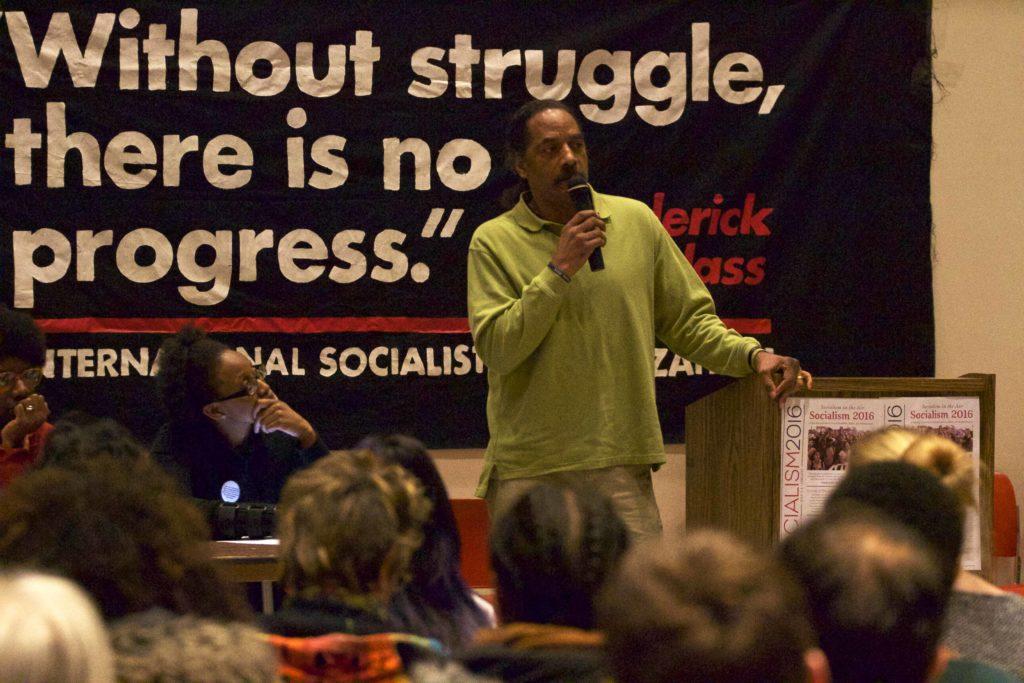By Caroline Boschetto, news staff
Groups in support of the black and Palestinian social liberation movements joined in solidarity at the Dudley branch of the Boston Public Library Wednesday night, where speakers and participants engaged in dialogue about the similarities between the groups’ struggles.
The event was sponsored by Boston’s branch of the International Socialist Organization, local university chapters of Students for Justice in Palestine – including Northeastern’s chapter – and other social activist organizations. It was the first event of the national Black/Palestine Solidarity Tour presented by Haymarket Books.
New York City poet and social advocate Remi Kanazi spoke at the event from his perspective as the son and grandson of Palestinian refugees.
“From 1947 to 1949, more than 750,000 Palestinians were ethnically cleansed; 531 villages were destroyed to make way for what became the state of Israel,” Kanazi said.
According to him, 50 Israeli laws systemically discriminate against Palestinians in regard to marriage, labor, social interaction and other aspects of life. Kanazi also said money from the US government and universities funds this oppression.
“US tax dollars […] and campus investments are standing in the way of [Palestinian] freedom,” he said. “We live in a country that gives Israel $3.4 billion a year in terms of military aid.”
Kanazi performed a poem he wrote titled “This Divestment Bill Hurts My Feelings.” He said the piece is a response to pro-Israel campus groups that oppose movements urging universities to stop funding companies that support the systematic oppression of Palestinians and other minorities.
Kanazi said he believes the liberation movements of blacks in America and Palestinians in Israel are rooted in similar problems and that both issues must be resolved to achieve true victory over oppression.
“If Palestinian liberation is achieved tomorrow while mass incarceration [of blacks] thrives and the policies of stop and frisk advance, then the picture is not complete,” he said.
Black author and International Socialist Organization member Khury Petersen-Smith spoke specifically about Northeastern’s failings in regards to racial oppression. According to Petersen-Smith, among its offenses, the university has been attacking its branch of Students for Justice in Palestine for the past few years.
Petersen-Smith said he believes there is a connection between the university arming its police with these weapons and gentrifying Roxbury because the university’s police department is located on the Roxbury side of the Orange Line tracks.
“Northeastern […] also is leading the gentrification of this neighborhood Roxbury, and is arming its police with semiautomatic weapons,” he said. “So yes, Northeastern is really bad. But it’s not just Northeastern. This is something that’s much much bigger.”
Another speaker, Aaron Dixon, is a black racial advocate who co-founded the Seattle chapter of the Black Panther Party. He said the Israeli government denying Palestinians clean water mirrors the water contamination crisis in Flint, Mich. which he said the US government did not do enough to remedy.
“[The Israeli government] had affectedly taken control over [Palestinians’] water and gave it out to them whenever they felt like giving it out to them,” Dixon said.
According to Dixon, this form of systematic oppression is one factor that unites the plights of blacks and Palestinians.
Event participant Alisa Aaronson said that she loved what the presenters had to say, although she wished there had been a female speaker.
“I think it’s really interesting to talk about the connections and how liberation struggles all over the world can be strengthened by connection to one another,” Aaronson said.
Gerardo Molinari from Somerville, Mass. said that he was captivated by the discussion of racial solidarity.
“Solidarity is not just an abstract feeling that you have for oppressed people while you enjoy all the good things that capitalism has to offer,” he said. “We need to become political, we need to organize, we need to fight back.”
Photo by Alex Melagrano















